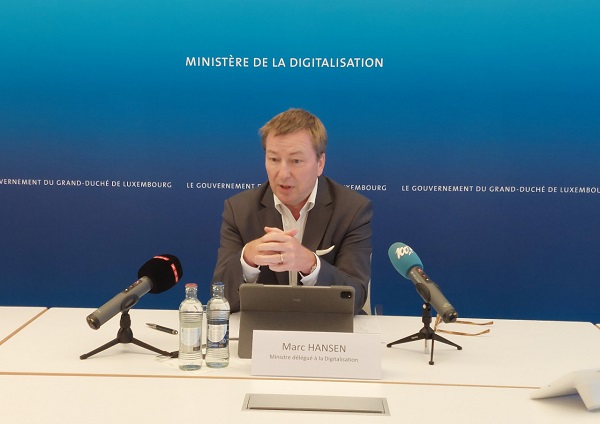 Marc Hansen, Luxembourg’s Minister Delegate for Digitalisation;
Credit: MinDigital
Marc Hansen, Luxembourg’s Minister Delegate for Digitalisation;
Credit: MinDigital
Luxembourg has secured a prominent position in the European Commission's eGovernment Benchmark 2023, retaining its third-place ranking for the second year in a row.
According to Luxembourg's Ministry for Digitalisation, the Grand Duchy’s digital public services maintained their high standing and demonstrated progress in all benchmark dimensions.
Notable improvements were recorded as follows:
- user centricity improved by +2 percentage points to 96%;
- transparency increased by +2 percentage points to 90%;
- key enablers gained +3 percentage points to reach 79%;
- cross-border services were enhanced by +1 percentage point to 91%.
This achievement follows Luxembourg's rise from the nineteenth position in the European Commission's 2019 ranking to its current position in 2022.
During a recent press conference, Marc Hansen, Luxembourg’s Minister Delegate for Digitalisation, expressed satisfaction with these results, emphasising that the progress reflects the ongoing efforts to advance eGovernment in Luxembourg. He highlighted Luxembourg's strength in eGovernment—the MyGuichet.lu platform, which centralises administrative procedures for citizens and businesses, offering various functionalities.
Luxembourg's success in eGovernment reportedly stems from projects initiated by the Ministry for Digitalisation and the Government IT Centre (Centre des technologies de l'information de l'État - CTIE). Notable initiatives include the GovTech Lab, open innovation partnerships with the private sector and platforms such as www.zesumme-vereinfachen.lu, which collect citizen proposals to simplify procedures.
Additionally, according to the ministry, projects focused on administrative simplification have led to improvements. For instance, identity cards no longer display holders' physical addresses, eliminating the need for new cards when moving. The National Public Inquiries Portal enables citizens to access current public inquiries and respond online.
Minister Hansen stressed that digital inclusion remains a top priority, with the Ministry of Digitalisation having implemented eighteen out of 40 initiatives proposed in the national action plan for digital inclusion.
Emerging technologies play a vital role in Luxembourg's digitalisation journey, according to the ministry. Luxembourg introduced the first public sector blockchain in 2019, leading to end-to-end digital student loan applications. Data security and verifiable credentials, including the national electronic wallet (eWallet), are central to projects.
Looking ahead, the Ministry for Digitalisation is reportedly developing a data-driven public sector and working on a public sector data strategy. The National Interoperability Framework (NIF) aims to enhance interoperability among public services.
In conclusion, Minister Hansen emphasised that Luxembourg's eGovernment Benchmark results underscore the milestones achieved in its digital transition, with each project laying a solid foundation for future developments.








